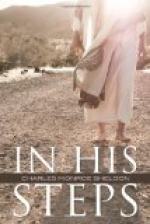He was more and more impressed with the appalling fact that the comparatively few men in that hall, now being held quiet for a while by Rachel’s voice, represented thousands of others just like them, to whom a church and a minister stood for less than a saloon or a beer garden as a source of comfort or happiness. Ought it to be so? If the church members were all doing as Jesus would do, could it remain true that armies of men would walk the streets for jobs and hundreds of them curse the church and thousands of them find in the saloon their best friend? How far were the Christians responsible for this human problem that was personally illustrated right in this hall tonight? Was it true that the great city churches would as a rule refuse to walk in Jesus’ steps so closely as to suffer—actually suffer—for His sake?
Chapter Thirty-one
He had planned when he came to the city to return to Raymond and be in his own pulpit on Sunday. But Friday morning he had received at the Settlement a call from the pastor of one of the largest churches in Chicago, and had been invited to fill the pulpit for both morning and evening service.
At first he hesitated, but finally accepted, seeing in it the hand of the Spirit’s guiding power. He would test his own question. He would prove the truth or falsity of the charge made against the church at the Settlement meeting. How far would it go in its self-denial for Jesus’ sake? How closely would it walk in His steps? Was the church willing to suffer for its Master?
Saturday night he spent in prayer, nearly the whole night. There had never been so great a wrestling in his soul, not even during his strongest experiences in Raymond. He had in fact entered upon another new experience. The definition of his own discipleship was receiving an added test at this time, and he was being led into a larger truth of the Lord.
Sunday morning the great church was filled to its utmost. Henry Maxwell, coming into the pulpit from that all-night vigil, felt the pressure of a great curiosity on the part of the people. They had heard of the Raymond movement, as all the churches had, and the recent action of Dr. Bruce had added to the general interest in the pledge. With this curiosity was something deeper, more serious. Mr. Maxwell felt that also. And in the knowledge that the Spirit’s presence was his living strength, he brought his message and gave it to that church that day.
He had never been what would be called a great preacher. He had not the force nor the quality that makes remarkable preachers. But ever since he had promised to do as Jesus would do, he had grown in a certain quality of persuasiveness that had all the essentials of true eloquence. This morning the people felt the complete sincerity and humility of a man who had gone deep into the heart of a great truth.




